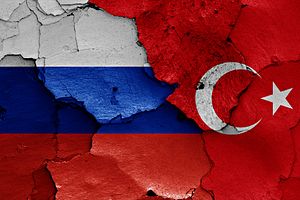Russia’s intervention in the Syrian Civil War is leaving the former Soviet republics on the Caspian Sea littoral in an uncomfortable place. Caught between their historic relationships with Moscow and concerns for their own security, Kazakhstan, Turkmenistan, and Azerbaijan are clearly in an unenviable political position. Moreover, unprecedented Russian military action risks destabilizing otherwise steady diplomatic ties.
A November 4 security agreement concluded by Kazakhstan and Azerbaijan is one indication that something is amiss in the Caspian Sea. The plan notably provides for joint Kazakhstan-Azerbaijan naval exercises on the inland sea.
Emerging Kazakhstan-Azerbaijan defense cooperation is likely derived, at least in part, from anxiety over Moscow’s use of the Caspian Sea in its Middle East operations. Russia’s Caspian Sea Flotilla fired cruise missiles at targets in Syria in October and November. While Astana has tempered its own statements on Russian military activity in the Caspian, Turkmenistan’s President Gurbanguly Berdimuhamedov spoke for his northern neighbors during a November 23 meeting with President Vladimir Putin. There, Berdimuhamedov indicated to his Russian counterpart that, “Our Kazakh colleagues are allegedly worried over what is going on over the Caspian Sea, which is linked with military issues.”
While Berdimuhamedov claimed to convey Kazakh fears, Turkmenistan may also be troubled by Russian operations on the Caspian. Turkmenistan maintains a distinctly neutral foreign policy platform. Still, the Turkmen government has lent rhetorical support to Ukraine in Kiev’s conflict with Russia. Turkmenistan expressed its apprehension over Moscow’s 2008 invasion of Georgia by conducting military drills in the Caspian—not unlike Kazakhstan and Azerbaijan’s planned exercises.
For its part, Russia openly subordinates the interests of the other Caspian littoral states to the effectiveness of its Syria campaign. In his late November meeting with Turkmenistan’s Berdimuhamedov, President Putin acknowledged that cruise missile launches were creating “some inconvenience” for Russia’s neighbors. Nonetheless, Putin stated that Russia would continue operations “as long as we think it appropriate.” This may be disconcerting for Kazakhstan, Turkmenistan, and Azerbaijan, but is consistent with Moscow’s post-Soviet strategic approach to the Caspian. Russia treats the Caspian as a legal condominium, meaning the entire sea is the joint property of all five littoral states. This outlook is generally applied to issues of energy exploitation. Still, from Russia’s perspective, a military reading could be a logical function of the same legal perspective.
Joint ownership of the Caspian is equitable policy only in theory. Because Moscow maintains the strongest military and most sophisticated energy infrastructure in the region, it effectively means that Kazakh, Turkmen, and Azerbaijani (and potentially Iranian) concerns are only respected when they do not conflict with Russian interests.
Russian military maneuvers in the Caspian already place the ex-Soviet littoral states in an awkward position relative Moscow. The November 24 downing of a Russian Sukhoi Su-24 jet by Turkey creates a host of ancillary problems in these relationships, further complicating the situation.
Kazakhstan consistently partners with Russia on regional economic and political initiatives in the post-Soviet space. Astana also maintains a positive relationship with Turkey, though Ankara’s pan-Turkic ambitions in Central Asia were never fully realized. Moreover, Kazakhstan does not adhere to Russia’s political platform on Syria. Instead, the Kazakh government presents itself as a potential mediator and has hosted negotiations among Syrian opposition factions. With little diplomatic maneuvering space, the Kazakh Foreign Ministry characterized the shootdown as a “tragic incident,” implored restraint from Moscow and Ankara, and indicated concern over deteriorating Russo-Turkish relations.
Azerbaijan’s status is similarly difficult. Russia maintains a strange relationship with Baku. Moscow is politically aligned with Armenia, Azerbaijan’s chief rival. Russia is also Azerbaijan’s primary arms supplier. In 1993, Turkey instituted an economic blockade against Armenia and sealed its borders with the South Caucasus state, measures of solidarity with Azerbaijan that remain in place to this day. Accordingly, Azerbaijan is approaching Russo-Turkish tensions with great sensitivity. Deputy Prime Minister Ali Ahmadov insisted that, “Azerbaijan does not want friendly countries [Russia and Turkey] to confront each other.” Ahmadov even proposed Azerbaijani mediation, declaring that Baku “is ready to offer its assistance to take the necessary steps within the framework of friendly relations with both states for the speedy elimination of unwanted tensions.”
Operations in Syria, Ukraine, and the Caspian represent Moscow’s largest armed undertakings beyond Russia’s borders since the Soviet collapse. Although states like Kazakhstan and Azerbaijan have generally enjoyed stable ties with Russia, unfolding military campaigns will continue to test the integrity of these typically positive relationships.
Evan Gottesman is a Lloyd C. Gardner Fellow at Rutgers University. You can follow Evan on Twitter at @EvanGottesman

































